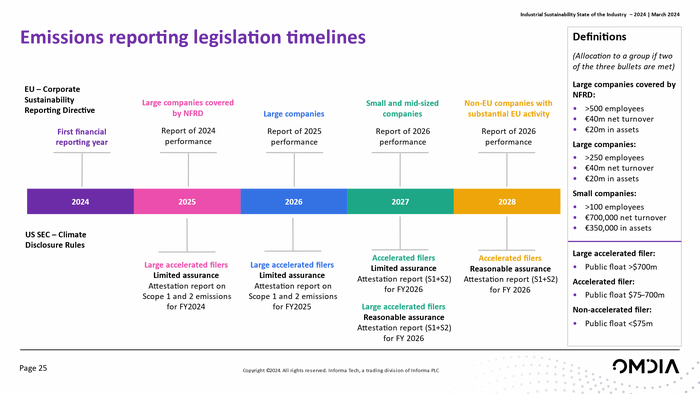The EU’s Manufacturing Sustainability Regulations Rule the World
The European Union’s environmental regulations for manufacturers have real teeth – and they apply to suppliers that sell into Europe.
April 12, 2024

At a Glance
- EU sustainability regulations reach beyond Europe.
- Suppliers to EU manufacturers also have to comply.
- Emerging regulations put a damper on greenwashing.
In most areas of industry, the rules set down by the European Union are stricter and come with greater force than US regulations. Just ask Microsoft. The same is true of emerging regulations guiding manufacturers on the reporting on environmental, social, and governance (ESG) issues. The reach of the EU regulations stretches beyond Europe’s geography, since the suppliers to European manufacturers also have to comply with the regulations.
We caught up with Alex West, senior principal analyst at the UK-based research firm, Omdia, to get the details of the EU’s environmental compliance regs.
How are US regulations for manufacturers different from those in Europe?
Alex West: Europe is ahead. One of the main regulations from the EU regarding sustainability reporting is the Corporate Sustainability Reporting Directive (CSRD). This requires large companies – 500+ employees – to report the impact of their business on the environment and society, this includes the emissions from their business, which must be audited. This means the company has to collect data on FY24 to report at the start of a company’s FY25. It has an impact on large EU companies initially but will expand to affect those companies selling into the EU (reporting of FY26 performance due in FY27).
If you’re a company with substantial sales in the EU, you will have to meet these regulations. There is a lag with the US. The US has politized these regulations with its SEC Climate Disclosure Rules. There have been of lot of backwards and forwards movements with this, and the SEC themselves recently paused the implementation of the regulation, whilst defending it in court. But there are also state-by-state sustainability requirements with California being more advanced.

Image courtesy of Omdia
Explain the nature of the EU’s sustainability reporting for manufacturers.
Alex West: Reporting doesn’t mean improvement. There’s a need for transparency. We’ve tracked reporting, and the quality of the data is varied. Traditionally, companies have been selective with what they report and will leave gaps if data is not favorable. Some of the data is questionable. You need financial-grade auditable data, and this is required with some of the upcoming regulations. From an accuracy point of view, it’s stringent. In France, reporting infringements can lead to fines of up to Euro 75,000 and the additional threat of up to five years imprisonment. You might think this is a problem for multinationals, but it also filters down to small- and medium-sized enterprises (SMEs).
When will SMEs need to begin reporting?
Alex West: In Europe, SMEs will need to report by FY 2027. You also have to ask, what is the reporting of my vendors and how people are using my products downstream? You may not be in the spotlight, but you need to be aware of the emissions of your suppliers, so it is the entire supply chain that’s involved in reporting. For example, large companies will require their supply chains to comply with reporting to ensure they are able to report the emissions (Scope 3) of their supply chain, with some companies mandating this level of reporting in order to even feature at the RFQ stage. It’s becoming table stakes in doing business over the next two or three years.
Do suppliers have to meet reporting requirements before they can sell to European manufacturers?
Alex West: Suppliers will have to do their own reporting for the leading manufacturing companies. Manufacturers are saying, if you don’t have CRSD, we’re not doing business with you. It becomes a must to work with your customers.
As sustainability grows in importance, are manufacturers more prone to greenwashing – overinflating their sustainability programs?
Alex West: Greenwashing is a matter of making claims around your business environmental performance that are not always proven or backed up by science. A company may claim to have an environmentally friendly product, without any justification behind the claim. Regulations have been developed to stop greenwashing claims. California released an anti-greenwashing law at the start of 2024. Companies have been taken to court for claims that are not true. Many companies have used sustainability as a marketing tool to differentiate their products or services.
Companies are also setting targets with no scientific way to achieve the targets. You have to have a roadmap for reaching the target.
As these efforts putting a damper on greenwashing?
Alex West: We’re starting to see a move away from greenwashing. It is going in the opposite direction. It remains an internal conversation, but companies are becoming more careful about going to market with their green capability claims. We track earnings calls and we’ve seen that over the last two years, references to sustainability and ESG [environmental, social, and governance] have declined about 38 to 48 percent respectively. Companies are even being advised not to discuss their green efforts externally for fear of accusations of greenwashing, in effect greenhushing.
Tell us about Omdia’s work in tracking sustainability in manufacturing.
Alex West: Marketing intelligence firm. We service a range of horizonal and vertical. One vertical is manufacturing. We’ve provided research in manufacturing for 30 years. We look at trends in technology, tracking the leading vendors and main movements. Ten years ago, we were tracking digitalization. In the last two or three years, we’ve been looking at sustainability. Manufacturing is a key player in need of a sustainability transition.
About the Author(s)
You May Also Like





